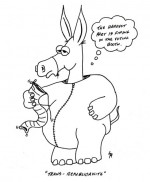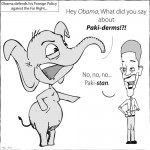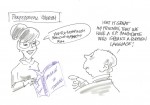Title
Subhead
Body
By the time many of our readers see this special feature of The Juilliard Journal, the 2008 presidential election will be history, and the country will know whether, on Inauguration Day, January 20, 2009, Barack Obama or John McCain will be sworn in as the 44th president of the United States. But the critical issues that influenced voters’ decisions will no doubt remain foremost on the minds of Americans—and, perhaps, people the world over. In the months leading up to the election, The Journal asked Juilliard students, faculty, staff, and alumni to share their answers to these questions:
—What are the one or two main issues in this year’s election that will influence your decision for whom to vote?
—If you are eligible to vote but will not, why not?
—If you are not a U.S. citizen, how do you think the outcome of this year’s presidential election will affect your country?
Following, in alphabetical order by writer, is a sampling of the answers we received (some have been edited for length). We thank everyone who participated in our survey. Unfortunately, space limitations restrict us from printing all the responses (to accommodate this special feature, we are suspending the Voice Box and Faculty Forum columns this month; they will return in the next issue). One final note: The Journal is not endorsing any candidate. In selecting the answers printed here, we have attempted to reflect as wide a variety of responses as we received.
— Ira Rosenblum
Let no one doubt: this is the most significant election in a generation. What is at stake, in a phrase, is “the restoration of confidence.” We lost confidence in our government when it became apparent that we had been misled about Iraq. We lost confidence in financial institutions as cavalier enforcement of existing safeguards and a lack of reasonable regulations led to the meltdown on Wall Street. We lost confidence in our health-care system as we saw too many Americans go without proper care and wondered whether our loved ones might be next. And we have lost confidence in our ability to deal with these and other issues. But until we get our financial house in order, until Americans become confident that the markets are trustworthy and fair, until we believe that our efforts and hard work will lead to financial security and affordable health care, we will have little time and patience for addressing other important issues, such as the decline in American prestige abroad and the subversion of established rights.
— Mitchell Aboulafia, Director, Liberal Arts Department
The issues? Environmental and educational policy, followed closely by foreign policy— specifically, replacing our current cowboy attitude with a policy aimed at global cooperation. This is the first election in my lifetime, although certainly not in recent history, that is poised so perfectly upon the brink of change. We have the opportunity to take a step toward harmony: harmony between man-made borders, harmony within our own bodies, and harmony with the world of natural resources, a world we cannot live without. Or we can continue to barrel toward the fate that ultimately follows any empire after it has reached its peak and still yearns for more.
— Jahana Azodi, Stage Management Intern
After the fall of the Soviet Union, the U.S. enjoyed nearly hegemonic status. The rise of China, India, Russia, the European Union, Brazil and petro-states such as Iran and Venezuela will ensure that, in the years to come, the world will move away from a unipolar alignment to a multipolar one. The U.S. must meet this challenge, moving away from Bush Doctrine-like, ideological, go-it-alone strategies toward a more flexible and less rigid economic and foreign policy framework. The U.S. still has the best colleges and research universities in the world, and we need to keep attracting the world’s best and brightest. This means fixing our immigration standards and allowing more student visas while not ceding security. It means having a foreign policy in which the State Department is the cornerstone, not the Pentagon. It means talking to those countries we find repellant as well as those which are our friends. It means living up to, and setting the standard for, internationally recognized agreements like the Geneva Conventions, instead of ignoring and flouting them. It means investing more (both monetarily and intellectually) in alternative energies, infrastructure, education, and the arts.
— Charles Borland, Drama ’01 (Group 30)
Continuation of the war in Iraq saps military resources needed to combat the actual threats to our security in Afganistan. The sooner we get out of Iraq, the better. There is no such thing as “victory” in a military engagement that should never have happened in the first place and that serves no real purpose. McCain is pursuing a fantasy. Obama is dealing with reality.
— Conrad Cummings, Evening Division Faculty
I was undecided about whom to vote for until McCain picked Sarah Palin—the moose hunting former beauty queen from Alaska who has pitifully little governing experience under her belt yet has already managed to lie and bully her way from mayor of Wasilla to governor—and now she is running for vice president of the United States, “a heartbeat away” from the presidency, as so many have noted. For those who are pleased that a woman could become V.P., please keep in mind that Palin is an anti-feminist who can’t differentiate between politics and religion. This may thrill the far right, but to me it’s just more of the extremism that the world doesn’t need.
— Karen Davis, ’72, Piano
I am so excited to be able to vote in this crucial election. I will vote for the candidate who has the perspective to see the United States as one member of a global community, the candidate whose policies reflect concern and love for Americans from all walks of life, the candidate who offers the hope that America will change and will reclaim its place in the world as a shining example of freedom, opportunity, and equality. I will vote for Barack Obama.
— Peter Dugan, Bachelor’s Student, Piano, Class of 2011
Universal health care, an end to a war that never should have been, a woman’s right to choose, and support for education and the arts are the most important issues for me. The Democratic ticket is the only choice for me. It is not about the persons on any ticket—black, white, male, or female—it is about the issues. I feel as though we have not much more of a window of opportunity to claim our former strength and respect in the world before it will be too late for us. This feels like the most important election ever in my adult life.
— Margo Garrett, Collaborative Piano Faculty
This election, for me, is all about what each candidate is going to do for women. Let’s look at McCain’s record: He has voted against every piece of legislation to explicitly give women equal rights or equal pay. He doesn’t think women have enough intelligence or sense or responsibility to decide what to do with their own bodies—he has said he’d put in Supreme Court Judges to overturn Roe v. Wade even in cases of rape, incest, or when the life of the mother is in danger. … He’s voted against clinic access and family planning—his views on women’s health are not to the right, they are extreme.
— Robin D. Gelman, M.M. ’92, Bassoon, 1992
The U.S. faces a series of very complex challenges in the international arena: climate change, terrorism, global poverty, and disease. These issues will require intelligent responses that go well beyond guns and bombs and threats. I am looking for a leader whose first instinct is not to start a war. I strongly believe most of the world is ready to love us—if we just stop being so unlovable.
With the ongoing severe economic squeeze, it will be easy to forget or put off the plight of the less fortunate in our country. The problem of our 50 million uninsured compatriots must remain on the agenda of whoever our new leader is. Similarly, we face significant challenges in education. With dropout rates of more than 50 percent in many urban schools, we need to address the issue squarely and find lasting solutions that will help prepare the young and less fortunate for the intense competition for global jobs that is surely coming.
— Tunde Giwa, Chief Information Officer
It is interesting how the Republicans complain about government telling people what to do until they become interested in interfering in people’s personal lives with self-righteous rectitude. They may know how to do well in elections but they don’t know how to govern, at least not the modern Republican Party. They are in the pocket of big oil and other major corporations who care only for the profits of their C.E.O.s and stockholders, not the middle class, and they pander to far-right religious fundamentalism which would see the Bible and not the Constitution as the basis of our government. Sounds like the Taliban?
— Joanna Goldstein, M.M. ’75, Piano
I am distressed to see our presidential election reduced to an “American Idol”-style popularity contest. My first response for a Juilliard poll should have been, “Which candidate will do the most to promote and support the arts in America?” What I would love to see would be the creation of a Works Progress Administration-type of program, a significant part of Roosevelt’s New Deal, which put thousands of creative people to work. My father, who grew up in the Iron Bound section of Newark, N.J., during the Depression, spoke highly of the many concerts he attended that were performed by W.P.A. musicians. He was particularly proud that our country provided the opportunity to perform, listen to, and learn about great music for the proud but poverty-stricken residents of his neighborhood. Who knows? If it hadn’t been for the Federal Music Project’s impact on my father, I might not have wound up studying at Juilliard!
— Justin Hartz, M.M. ’87, Organ
I must say that Sarah Palin’s position on economics and abortion has convinced me to swing my vote to the G.O.P. She is like a breath of fresh air that has wafted over the Republican Party. She walks the walk and talks the talk in her duties as governor of Alaska, a position with lots of executive experience. Also, knowing that she was going to give birth to a Down syndrome baby and bringing him to full term while considering the event a blessing speaks to her strong character as a candidate as well as a person.
— Richard Hebert, ’59, Bassoon
I have been adamantly against the Iraq war from the beginning, but just last year I also lost a friend who was serving in Iraq. He was killed on Christmas Day, leaving behind two small children. We are running our economy into the ground, and sending our soldiers off to die, for a war that was waged based on falsehoods and deceit.
— Amanita Heird, Assistant Director, Special Events
We are a country at war and now isn’t the time to vote for a rookie—only McCain has the experience necessary to continue the strides we have been making towards victory in Iraq and to shore up the problems we’ve begun having in Afghanistan. We can’t afford a president so naïve who wishes to talk without conditions to our biggest enemies. And, particularly in this economic climate, the last thing we need is a president like Obama, whose record is among the most protectionist. We need lower taxes for everyone, not just the Wal-Mart moms, but the fat cats who employ Nascar dads. If a government wants to stimulate jobs, then it should probably decrease taxes on those who provide them.
— Brad Heller, Pre-College ’01, Cello
The main issues for me are foreign policy (in particular, ending the war in Iraq and restoring emphasis on diplomatic efforts) and upcoming Supreme Court appointments—considering that two or even three justices are likely to retire, it is crucial to maintain a balanced court and not an extreme right-wing court that would influence interpretation of the constitution for a generation.
— Michael L. Ippolito, Master’s Student in Composition, Class of 2010
The most important issues, in my opinion, are national security and the economy. I was recently reminded that, before receiving a spot on the national ticket as vice president, another Republican reformer was under 45 years old, had many children, loved the outdoors, was a hunter, and had spent only two years in the governor’s office ... his name was Teddy Roosevelt.
— Janice Wheeler Jubin, B.M. ’73, M.M. ’74, Piano
I can’t remember an election that felt more important. I’m frankly terrified by both John McCain and Sarah Palin—leaders who talk blithely about taking away a woman’s right to choose even in the event of rape, advocate a health insurance system that will cover fewer, rather than more Americans, insert religion into every aspect of public life, press for book censorship, and endorse lies about the causes for the war in Iraq are not the people I want taking charge of this nation. I’ve had enough of feeling ashamed of the country where I live. How can a nation built on principles of equality, human rights, and the separation of church and state possibly endorse torture, religion in the classroom, and a tax structure where the rich get continually richer and the poor continually poorer?
— Catherine Kautsky, M.M. ’76, Piano
Domestically, the regulation of business excesses by control of money-making greed and enforcement of ethical standards in conjunction with appropriate higher taxation of corporations and the wealthy, especially in the light of the $700-billion bailout of the loan and investment industry. The money gained should be used domestically for education, infrastructure, and health services. Foreign policy-wise, how can the U.S. revitalize it reputation abroad to counter the effects of unilateralism of the Iraqi war involvement and contempt for the opinions and practices of other nations. If the Pax Americana is over, what kind of influence remains that might be true to the working democratic principles hopefully still remaining within the governing of the U.S.A.?
— Elizabeth Keen, Dance Division Faculty
The proper question to ask regarding Iraq is no longer “Was invading Iraq the right thing to do?” Since we are already there, the relevant issue is ensuring that Iraq becomes as stable as possible. Seeing this through will require creativity, cultural sensitivity, and most of all, patience. As national stability is gradually achieved through a sustained, superior military presence, economic prosperity and freer education will slowly supplant more localized prejudices and foster a new national identity. This necessary military presence is not something Iraq is capable of at this time; since we overthrew the previous government, we are responsible for establishing this new one, avoiding civil war and the deaths of potentially millions of civilians.
— Alex McDonald, First-Year D.M.A., Piano
The U.S. presidential elections will definitely affect my country. Barack Obama has pledged to recognize the Armenian genocide perpetrated by the Ottoman Turks from 1915-23, which the U.S. government has refused to recognize for so many years, because of Turkey being a U.S. ally. John McCain has avoided using the term genocide, just like the current administration, in describing these massacres. It’s amazing that a country like the U.S.A., supposedly a big defender of freedom and human rights, a country that stands for historical and human justice, will not properly acknowledge these events!
— Aleksandr Nazaryan, Master’s Student, Viola, Class of 2009
The two most important issues for me are gay rights and the environment. You can deduce from that who I’m voting for. As a lesbian married to a non-U.S. citizen, I am not easily able to live with my partner here in my own country under the current laws! Therefore it has to be the most important issue for me in the elections. I’m voting absentee from my home in Germany, where our union is fully legally recognized.
— Brenda Patterson, M.M. ’02, Voice
The most important issue our country is facing is the inevitable depletion of our energy resources. This country needs a comprehensive plan to wean itself off of fossil fuels and the sooner we begin that process the better off we will be as oil and gas become even scarcer commodities than today. There is no reason why every building in the country shouldn’t have solar power on its roof, and with the right mindset and governmental leadership, huge advances can be made in other forms of alternative energy. Other beneficial side effects of a plan like this would be a boost in the economy as we position ourselves at the forefront of an inevitable migration to these technologies around the world, a cleaner and healthier environment, and more freedom in political dealings with oil-producing nations.
— Jeremy Pinquist, Manager, Network and Operations, I.T.
I am a Canadian and Swiss citizen and am not eligible to vote in this election; nonetheless, I am following it with both dread and hope, for its outcome will profoundly affect the entire world.
The past eight years have plunged the United States, and many other countries, in a long, unnecessary, fruitless, and unjust war, and cost the lives of many more Iraqi civilians, not to mention American soldiers, more people in all than died on 9/11. America is also in the worst economic straits since the Great Depression, and much of the Western world is being pulled along into this abyss. A change in direction is direly needed. … Although I cannot vote, I can expound, as I am doing now, as well as hope for the better future that we could all have.
— Claudia Schaer, B.M. ’02, M.M. ’02, Violin
The important issues for me are foreign policy, geopolitics, and energy diversity, which are fundamentally important issues not only for national security, but for future economic prosperity as well. I am a U.S. citizen, but I was not born here. The outcome of this year’s presidential election will not only affect my birth-country, Georgia, but it could actually decide its existence as a free, democratic, and geopolitically important country.
— Nona Shengelaia, Director of International Advisement
I will not vote, because there is no one worth voting for. The Democratic candidate has 187 days job experience. How could anyone elect a C.E.O. of the largest “corporation” in the world with 187 days job experience? The Republican candidate is a tired, worn-out warhorse with a vice presidential candidate right from a comic book.
— Frederick Silver, B.S. ’59, ’61, Composition
The one major issue I would say I will be voting on is foreign policy. There are numerous other domestic issues that I will also take into account—such as education, health care, and taxes—which are all linked together for me. I prefer to elect an administration that would seek to work with the rest of the world in solving our problems, rather than bully them into submission. I feel Barak Obama and Joe Biden embody that sentiment of diplomacy and intelligence. I would feel comforted knowing that such men are representing me and my views to the rest of the world—sometimes a world that has a history of violence and hatred towards America.
— James Sofranko, B.F.A. ’00, Dance
The next president has the responsibility to restore respect to the executive branch of government, and to its role as mandated by the Constitution. I long for the day in which my fellow citizens no longer naively pine for a commander-in-chief who is “just like me.” I don’t want a president who is just like me: I want the smartest, most perspicacious, level-headed person imaginable to lead the world’s most powerful nation; someone who is capable of critical thinking and well-versed in matters of commerce, international affairs, and the future needs of our country; someone who instills confidence without hatemongering; someone who understands that it is America’s responsibility and great legacy to foster democracy and personal freedom for all people, but who also respects the traditions of others; someone who understands that religion has no place in government; someone who realizes that environmental stewardship requires bold thinking; someone who does not recklessly destroy our system of checks and balances for political gain. I long for a cultural climate in which informed, considered discourse and debate are not branded as elitist or unpatriotic, but as the right and responsibility of every citizen. Mostly, I long for a president who does not govern by pandering to our worst fears and our basest hatreds. I also wouldn’t mind a president who can pronounce the word “nuclear.”
— Benjamin Sosland, Administrative Director, Historical Performance Program
I choose the candidate I vote for based on the human being and what I can best discern to be a principled person of integrity. I also want our leader to have communication/diplomacy skills and a breadth of scope capable of navigating the complex issues in our world today. I think Obama demonstrates all these qualities, plus a quality that hasn’t been seen on the horizon since J.F.K. and Martin Luther King Jr.—he is a visionary with the capability to inspire the masses to a vision of hope and change. He couldn’t have shown up at a more crucial time in our history.
— Mary Stein, Drama ’82 (Group 13)
The two main issues for me: 1. National security—one of the government’s main jobs is the defense of our land. Politicians spend a lot of money on things the government really doesn’t have any business doing. We need someone who understands national defense, international affairs, and the needs of our armed forces. 2. Right to life—among our inalienable rights, the first one enumerated in our founding documents is life. It doesn’t get any more basic than that. Our government needs to protect the lives of the innocent, and there are none more innocent than the unborn.
— Steven K. Walton, M.M. ’92, Tuba











